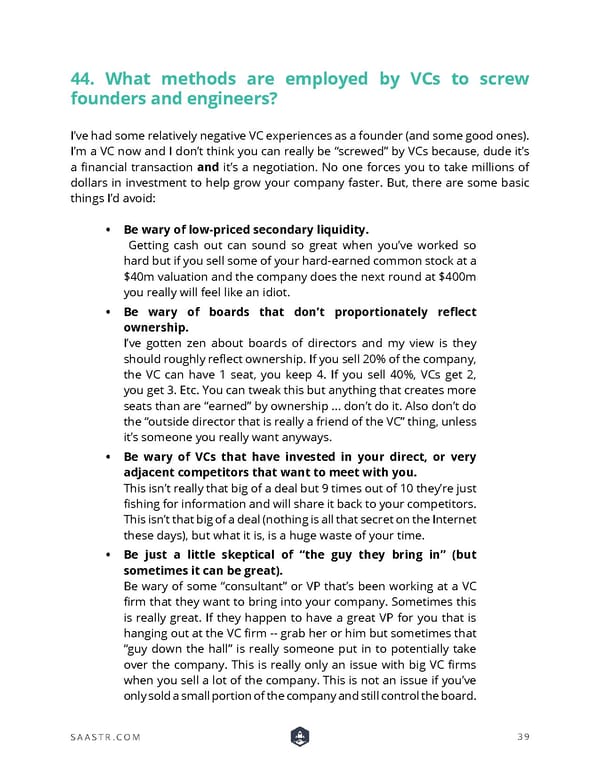44. What methods are employed by VCs to screw founders and engineers? I’ve had some relatively negative VC experiences as a founder (and some good ones). I’m a VC now and I don’t think you can really be “screwed” by VCs because, dude it’s a financial transaction and it’s a negotiation. No one forces you to take millions of dollars in investment to help grow your company faster. But, there are some basic things I’d avoid: • Be wary of low-priced secondary liquidity. Getting cash out can sound so great when you’ve worked so hard but if you sell some of your hard-earned common stock at a $40m valuation and the company does the next round at $400m you really will feel like an idiot. • Be wary of boards that don’t proportionately reflect ownership. I’ve gotten zen about boards of directors and my view is they should roughly reflect ownership. If you sell 20% of the company, the VC can have 1 seat, you keep 4. If you sell 40%, VCs get 2, you get 3. Etc. You can tweak this but anything that creates more seats than are “earned” by ownership ... don’t do it. Also don’t do the “outside director that is really a friend of the VC” thing, unless it’s someone you really want anyways. • Be wary of VCs that have invested in your direct, or very adjacent competitors that want to meet with you. This isn’t really that big of a deal but 9 times out of 10 they’re just fishing for information and will share it back to your competitors. This isn’t that big of a deal (nothing is all that secret on the Internet these days), but what it is, is a huge waste of your time. • Be just a little skeptical of “the guy they bring in” (but sometimes it can be great). Be wary of some “consultant” or VP that’s been working at a VC firm that they want to bring into your company. Sometimes this is really great. If they happen to have a great VP for you that is hanging out at the VC firm -- grab her or him but sometimes that “guy down the hall” is really someone put in to potentially take over the company. This is really only an issue with big VC firms when you sell a lot of the company. This is not an issue if you’ve only sold a small portion of the company and still control the board. SAASTR.COM 39
 The Ultimate Guide For Scaling Sales & Raising Capital Page 42 Page 44
The Ultimate Guide For Scaling Sales & Raising Capital Page 42 Page 44